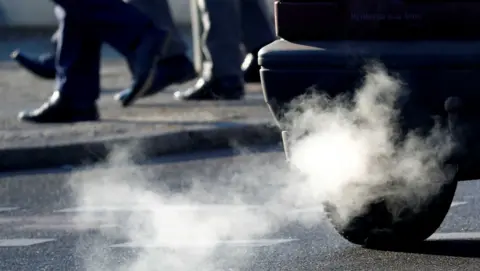The drive to net zero picks up speed in Reading
 BBC
BBCThe more pollution your car pumps out, the more we will make you pay to park - that is the message from Reading Borough Council.
Drivers using cars with the highest carbon dioxide emissions could see their parking charges more than double under the plans. The sliding scale of tariffs would apply to parking permits and on-street meters, but not yet to car parks.
A smaller Ford Focus might cost £1.20 to park for an hour, while a BMW X7 diesel could be charged £3.40, according to the tariff table.
For now, it is just a plan, but Reading council is preparing to take the next step towards making this a reality for thousands of drivers by seeing what people think of it.
It is by no means the first English town or city to want to go down this route.
Bath introduced its own emissions-based car parking scheme back in 2022, with higher polluting vehicles charged slightly more to encourage a shift to cleaner, more sustainable travel.
'Radical move'
Reading councillors already know it would be deeply unpopular with some - 70% of residents who took part in a small-scale informal survey in March said they either disagreed or strongly disagreed they should pay more for a parking permit if their cars were more polluting.
While acknowledging the issue, John Ennis, the councillor in charge of the borough's transport network, said 30% of people who live in Reading did not have a car anyway, adding: "It's a radical move from a radical council who are serious about protecting the environment and getting to net zero by 2030, while also cleaning our air."
He also said it was important to get the scale of any permit price rises into perspective, saying the owner of a Mini Cooper would have to pay 22p more per week while the owner of a two-litre Land Rover Discovery would see a 55p rise.
"You can get a Mars bar with that somewhere in Reading," he added.
While it has been some time since you could buy a Mars bar for 55p, Mr Ennis said the financial hit some will take under this plan was unavoidable if the council is to meet its pledge to be net zero by 2030.
A public consultation on the idea will run from 26 June to 15 July.
If the scheme goes ahead, motorists could see the new charges from late autumn.
